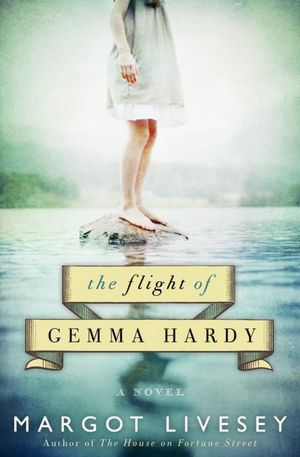An orphan girl, despised by her aunt and cousins, is sent to a boarding school where privations and abuse are mainstays. The girl grows up and takes a position in a remote manor house teaching a little girl whose guardian is both charismatic and mysterious. Sound familiar? It should. Margot Livesey's The Flight of Gemma Hardy (Harper Collins, 2012) is a retelling of Charlotte Brontë's Jane Eyre. Set in Scotland in the 1950s and 60s, the novel is both clever and inventive in how it manages the parallels to the original work. Gemma, born in Iceland, is taken to live with her mother's brother's family at Yew House when both of her parents die. The opening chapters closely match Brontë's work, from the "not taking a walk" first lines, to the a "bird book" enjoyed in a secluded window-seat. Claypoole (read Lowood) is a house of horrors: Gemma is taken on scholarship, and in return, she must serve as a "working girl"--basically an unpaid servant, which allows for interesting class dynamics as the divisions between the working girls and the regular students are severe.
In the first part of the book, the primary differences between Jane Eyre and Gemma Hardy are in the heroine's allies. Unlike Jane, Gemma not only remembers but loves her uncle, who is a kindly minister who dies just before the beginning of the book. No Betsy, but there is Mrs. Marsden, Gemma's aunt's housekeeper. No Miss Temple, but, interestingly, a Mr. Donaldson, the teacher at Gemma's school before she leaves for Claypoole: he tries to warn Gemma off the boarding school, but becomes a victim of his own good intentions. The Helen Burns character is rechristened Miriam Goodall, an asthmatic regular student who befriends Gemma. She doesn't seem to have the same degree of influence on Gemma as Helen has on Jane, and lacks Helen's stoic faith. Faith in general seems to be in short supply in this novel, despite Gemma's uncle's vocation, and, more crucially, despite the overwhelming importance of both Christian themes and images in Jane Eyre.
The second part of the book, Gemma's sojourn at Blackbird Hall (there is an extended bird motif through the whole novel), is perhaps the most enjoyable. Gemma's advertisements land her in the Orkneys, the islands in northern Scotland, working for Mr. Hugh Sinclair, teaching his niece Nell (rhymes with Adele!) It is in this section, however, that the story begins to spin away from the Jane Eyre story most clearly. Gemma as adult is less like Jane than she was as a child. She lacks Jane's unflinching self-possession, and this is demonstrated most strikingly in her reasons for running away from Blackbird Hall after Mr. Sinclair's secret has been revealed (Mr. Sinclair, by the way, is not nearly as much a bad boy as Mr. Rochester). Jane leaves Rochester, not because he has deceived her and tried to trick her into bigamy--she forgives him the instant he asks before she ever leaves Thornfield. She does not leave because she is angry with him. She leaves because of a moral impulse--she is terribly tempted by his pleading that they remain together even though his wife lives. She flees because she wants to be able to maintain her self-respect--she would rather risk starvation on the moors than to act on her passion for Rochester. Gemma leaves because she is angry. She leaves because she has been deceived. There is no real moral compulsion to flee, so her reasoning takes on a self-righteous tone. She leaves because she wants to "find herself."
OK. Enough fussing. The novel is actually really good. I sped through it, intrigued to find out what would happen to Gemma (although, of course, you can probably guess). The novel is an original work in its own right, and although I feel that the novel didn't truly capture the essence of Jane's character and choices (and I think it could have and still maintained it's originality), it is entertaining nevertheless. It is fun to find the clever ways that Livesey alludes to the original work, and at times I was reading the novel with the memory of the corresponding passage in my mind, almost superimposed above the words on the page. This is definitely a novel that I would love to dissect with another Jane Eyre fan---so, get on it!
Recommended if you love or even like Jane Eyre, enjoy coming of age stories, are interested in Scottish geography and a bit of history.
On a related note: my review of Fukunaga's film adaptation of Jane Eyre

No comments:
Post a Comment